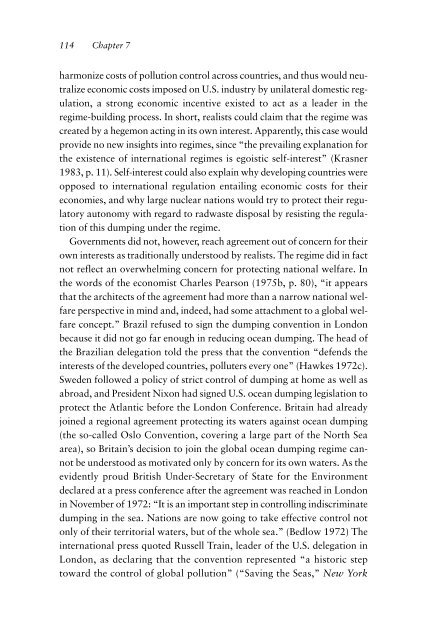Radioactive Waste Disposal at Sea: Public Ideas ... - IMO
Radioactive Waste Disposal at Sea: Public Ideas ... - IMO
Radioactive Waste Disposal at Sea: Public Ideas ... - IMO
Create successful ePaper yourself
Turn your PDF publications into a flip-book with our unique Google optimized e-Paper software.
114 Chapter 7<br />
harmonize costs of pollution control across countries, and thus would neutralize<br />
economic costs imposed on U.S. industry by unil<strong>at</strong>eral domestic regul<strong>at</strong>ion,<br />
a strong economic incentive existed to act as a leader in the<br />
regime-building process. In short, realists could claim th<strong>at</strong> the regime was<br />
cre<strong>at</strong>ed by a hegemon acting in its own interest. Apparently, this case would<br />
provide no new insights into regimes, since “the prevailing explan<strong>at</strong>ion for<br />
the existence of intern<strong>at</strong>ional regimes is egoistic self-interest” (Krasner<br />
1983, p. 11). Self-interest could also explain why developing countries were<br />
opposed to intern<strong>at</strong>ional regul<strong>at</strong>ion entailing economic costs for their<br />
economies, and why large nuclear n<strong>at</strong>ions would try to protect their regul<strong>at</strong>ory<br />
autonomy with regard to radwaste disposal by resisting the regul<strong>at</strong>ion<br />
of this dumping under the regime.<br />
Governments did not, however, reach agreement out of concern for their<br />
own interests as traditionally understood by realists. The regime did in fact<br />
not reflect an overwhelming concern for protecting n<strong>at</strong>ional welfare. In<br />
the words of the economist Charles Pearson (1975b, p. 80), “it appears<br />
th<strong>at</strong> the architects of the agreement had more than a narrow n<strong>at</strong>ional welfare<br />
perspective in mind and, indeed, had some <strong>at</strong>tachment to a global welfare<br />
concept.” Brazil refused to sign the dumping convention in London<br />
because it did not go far enough in reducing ocean dumping. The head of<br />
the Brazilian deleg<strong>at</strong>ion told the press th<strong>at</strong> the convention “defends the<br />
interests of the developed countries, polluters every one” (Hawkes 1972c).<br />
Sweden followed a policy of strict control of dumping <strong>at</strong> home as well as<br />
abroad, and President Nixon had signed U.S. ocean dumping legisl<strong>at</strong>ion to<br />
protect the Atlantic before the London Conference. Britain had already<br />
joined a regional agreement protecting its w<strong>at</strong>ers against ocean dumping<br />
(the so-called Oslo Convention, covering a large part of the North <strong>Sea</strong><br />
area), so Britain’s decision to join the global ocean dumping regime cannot<br />
be understood as motiv<strong>at</strong>ed only by concern for its own w<strong>at</strong>ers. As the<br />
evidently proud British Under-Secretary of St<strong>at</strong>e for the Environment<br />
declared <strong>at</strong> a press conference after the agreement was reached in London<br />
in November of 1972: “It is an important step in controlling indiscrimin<strong>at</strong>e<br />
dumping in the sea. N<strong>at</strong>ions are now going to take effective control not<br />
only of their territorial w<strong>at</strong>ers, but of the whole sea.” (Bedlow 1972) The<br />
intern<strong>at</strong>ional press quoted Russell Train, leader of the U.S. deleg<strong>at</strong>ion in<br />
London, as declaring th<strong>at</strong> the convention represented “a historic step<br />
toward the control of global pollution” (“Saving the <strong>Sea</strong>s,” New York

















